11 Herbal Teas For Osteoarthritis
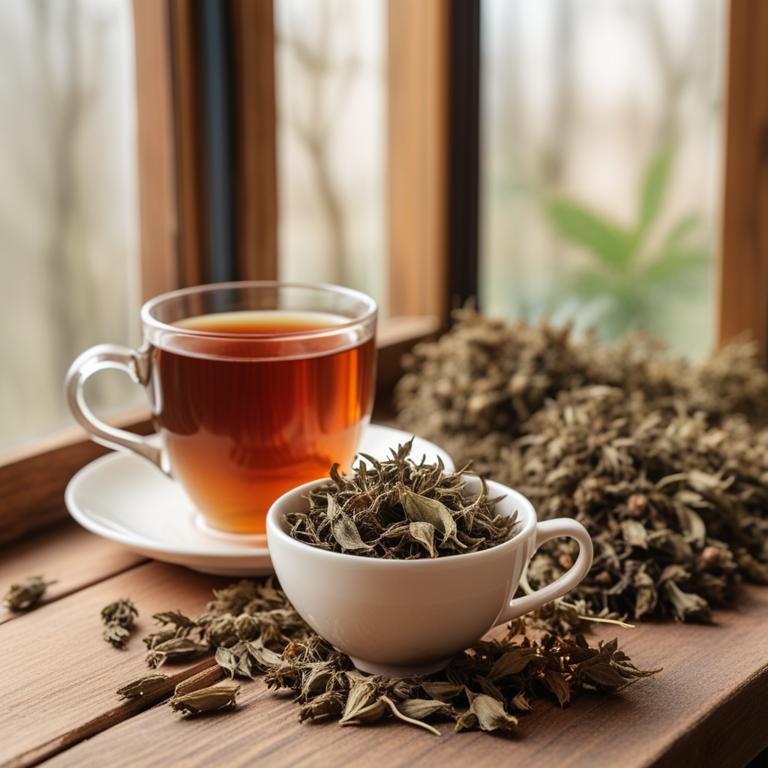
Herbal teas have been used for centuries to help manage osteoarthritis, a condition that causes joint pain and stiffness.
These teas work by reducing inflammation and easing pain in the joints. For example, Curcuma longa, also known as turmeric, contains a compound called curcumin, which is a powerful anti-inflammatory agent. When consumed as a tea, curcumin helps to reduce joint inflammation and pain, making it easier to move around. Another herb that's often used to make tea for osteoarthritis is Zingiber officinale, or ginger. Ginger has anti-inflammatory properties that help to reduce pain and stiffness in the joints. It also helps to improve circulation, which brings more oxygen and nutrients to the joints, promoting healing and reducing pain.
Ginkgo biloba is another herb that's often used to make tea for osteoarthritis. It has anti-inflammatory properties that help to reduce joint pain and stiffness, and it also helps to improve circulation and reduce oxidative stress in the body. When consumed as a tea, ginkgo biloba can help to reduce joint pain and improve mobility, making it easier to engage in daily activities. Drinking herbal teas for osteoarthritis can bring many benefits to your life. For one, it can help to reduce your reliance on pain medication, which can have negative side effects. It can also help to improve your overall sense of well-being, as you're able to engage in activities that bring you joy without being held back by pain.
Additionally, herbal teas are often gentle on the body and can be consumed in moderation, making them a great option for people who are looking for a natural way to manage their osteoarthritis symptoms.
- 1. Curcuma longa
- 2. Zingiber officinale
- 3. Ginkgo biloba
- 4. Glycyrrhiza glabra
- 5. Harpagophytum procumbens
- 6. Boswellia serrata
- 7. Panax ginseng
- 8. Salix alba
- 9. Withania somnifera
- 10. Salvia miltiorrhiza
- 11. Rheum palmatum
1. Curcuma longa

Curcuma longa teas contains compounds like curcumin, demethoxycurcumin, and bisdemethoxycurcumin, which are responsible for its anti-inflammatory and antioxidant properties.
Curcumin, in particular, has been shown to reduce joint inflammation and pain in people with osteoarthritis by inhibiting the production of pro-inflammatory enzymes. Demethoxycurcumin and bisdemethoxycurcumin, on the other hand, have potent antioxidant effects that help protect joints from oxidative damage and promote healing. The anti-inflammatory and antioxidant properties of these compounds can help slow down the progression of osteoarthritis and improve joint function and mobility.
Regular consumption of Curcuma longa teas may help alleviate symptoms of osteoarthritis and improve quality of life for those affected.
- Gather 1 tablespoon of dried Curcuma longa root. You can buy it at a health food store or online.
- Boil 1 cup of water in a kettle or on the stove.
- Add the 1 tablespoon of Curcuma longa root to the boiling water.
- Reduce heat and let it simmer for 5-7 minutes. This will help the Curcuma longa root release its active ingredients.
- Strain the tea into a cup and drink while warm. You can add honey or lemon to taste, but it's not necessary.
2. Zingiber officinale

Zingiber officinale teas contains compounds like gingerols and shogaols, which are responsible for its anti-inflammatory properties.
These compounds work by inhibiting the production of pro-inflammatory enzymes and cytokines, which contribute to the pain and swelling associated with osteoarthritis. Gingerols and shogaols also have antioxidant properties, which help to reduce oxidative stress and inflammation in the joints. Additionally, Zingiber officinale teas contains kaempferol, a flavonoid that has anti-inflammatory and antioxidant effects, which may help to slow down the progression of osteoarthritis.
The combination of these bioactive constituents makes Zingiber officinale teas a potential natural remedy for managing osteoarthritis symptoms.
- Gather 1 teaspoon of dried Zingiber officinale root and 1 cup of boiling water.
- Place the dried root in a tea infuser or directly into a cup.
- Pour 1 cup of boiling water over the root and let it steep for 5-7 minutes.
- Strain the liquid and discard the root. Add honey or lemon to taste.
- Drink 1-2 cups of the tea 2-3 times a day to help alleviate osteoarthritis symptoms.
Zingiber Officinale Tea on Amazon
FGO Organic Ginger Tea, 100 Count, Eco-Conscious Tea Bags, Caffeine Free, Packaging May Vary (Pack of 1)
Disclaimer: We earn a commission if you click this link and make a purchase at no additional cost to you.
3. Ginkgo biloba

Ginkgo biloba teas contains bioactive constituents like flavonoids and terpenoids that have anti-inflammatory properties.
These properties can help reduce joint pain and swelling associated with osteoarthritis. The tea also contains antioxidants that can protect the joints from damage caused by free radicals. Ginkgo biloba's flavonoids can also improve blood flow to the joints, which is essential for delivering oxygen and nutrients to the damaged tissues.
Regular consumption of Ginkgo biloba tea may help slow down the progression of osteoarthritis by reducing inflammation and promoting healthy joint function.
- Gather 2 teaspoons of dried Ginkgo biloba leaves. You can buy them at a health store or online.
- Boil 1 cup of water in a pot. Remove from heat.
- Add the 2 teaspoons of dried Ginkgo biloba leaves to the boiling water. Let it steep for 5-7 minutes.
- Strain the tea into a cup using a tea strainer or a piece of cheesecloth. Discard the leaves.
- Drink the tea 1-2 times a day, ideally before meals, as needed for osteoarthritis relief.
4. Glycyrrhiza glabra

Glycyrrhiza glabra teas contains a group of bioactive constituents called glycosides and triterpenoids, including glycyrrhizin, licoricidin, and licorisoflavan A.
These compounds have anti-inflammatory and antioxidant properties, which help to reduce joint inflammation and oxidative stress associated with osteoarthritis. Glycyrrhizin, in particular, inhibits the activity of an enzyme called 11β-hydroxysteroid dehydrogenase, which can contribute to joint inflammation and pain. The anti-inflammatory and antioxidant properties of Glycyrrhiza glabra teas may also help to improve joint mobility and reduce cartilage damage.
The flavonoids present in the tea, such as licoricidin and licorisoflavan A, have also been shown to have anti-inflammatory and antioxidant effects, further contributing to the potential benefits of Glycyrrhiza glabra teas for osteoarthritis.
- Gather 1 teaspoon of dried Glycyrrhiza glabra root and 1 cup of boiling water.
- Steep the Glycyrrhiza glabra root in the boiling water for 5-7 minutes.
- Strain the mixture into a cup to remove the root.
- Add 1 tablespoon of honey (optional) to the tea and stir well.
- Drink 1 cup of the tea 2-3 times a day for relief from osteoarthritis symptoms.
5. Harpagophytum procumbens
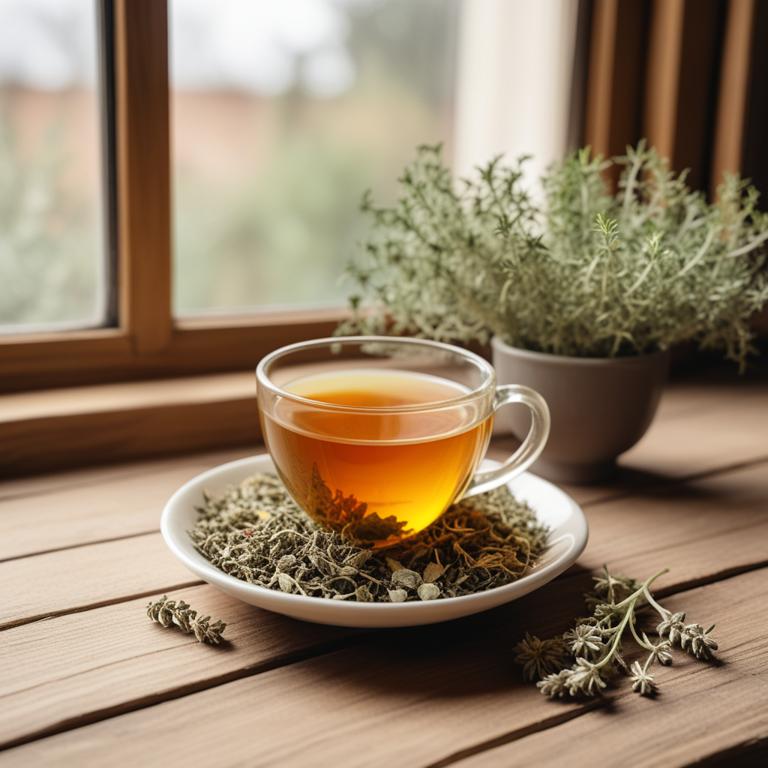
Harpagophytum procumbens teas contains the active constituents harpagoside and harpagide.
These compounds have anti-inflammatory properties that help reduce pain and swelling in joints affected by osteoarthritis. The flavonoids and phenolic acids present in the tea also have antioxidant properties, which can help protect the joints from further damage. Harpagophytum procumbens teas may also help improve joint mobility and reduce stiffness by reducing inflammation and promoting the repair of damaged tissue.
The combination of anti-inflammatory and antioxidant properties in Harpagophytum procumbens teas makes it a promising natural remedy for managing osteoarthritis symptoms.
- Gather 2 tablespoons of dried Harpagophytum procumbens root powder.
- Boil 1 cup of water in a pot.
- Add the 2 tablespoons of Harpagophytum procumbens root powder to the boiling water.
- Reduce heat and let it simmer for 5-7 minutes.
- Strain the tea and drink it while warm, up to 3 times a day.
6. Boswellia serrata
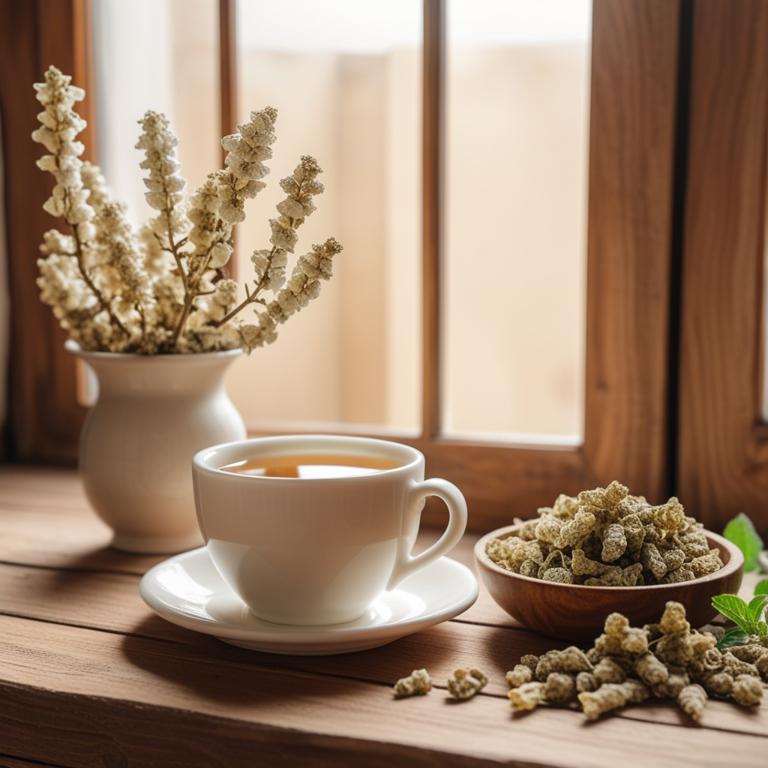
Boswellia serrata teas contains boswellic acids, specifically AKBA and BOS, which have anti-inflammatory properties.
These compounds work by inhibiting the production of pro-inflammatory enzymes, such as COX-2 and 5-LOX, which contribute to the pain and inflammation of osteoarthritis. The boswellic acids also have analgesic and anti-arthritic effects, which help to reduce joint pain and inflammation. Additionally, Boswellia serrata teas has been shown to inhibit the activity of cytokines, which are proteins that promote inflammation in the body.
By reducing inflammation and pain, Boswellia serrata teas may help to improve joint mobility and reduce the symptoms of osteoarthritis.
- Gather 1 teaspoon of dried Boswellia serrata powder and 1 cup of boiling water.
- Pour the boiling water over the Boswellia serrata powder in a cup or teapot.
- Steep the mixture for 5-10 minutes to allow the powder to infuse.
- Strain the liquid using a fine-mesh sieve or cheesecloth into a cup.
- Drink the tea 2-3 times a day as needed, ideally 30 minutes before meals.
7. Panax ginseng

Panax ginseng teas contains bioactive constituents like ginsenosides, which have anti-inflammatory properties.
These properties help to reduce the inflammation that causes joint pain in osteoarthritis. Ginsenosides also have antioxidant effects, which protect the joints from damage caused by free radicals. Additionally, the ginsenosides in Panax ginseng teas can help to improve blood flow and reduce pain by increasing the production of pain-relieving compounds.
By reducing inflammation and improving blood flow, Panax ginseng teas may help to alleviate the symptoms of osteoarthritis.
- Gather 1 cup of water, 1 tablespoon of dried Panax ginseng root, and a tea infuser or a heat-resistant cup.
- Boil the water in a kettle or on a stove. Let it cool for 1-2 minutes.
- Add the dried Panax ginseng root to the tea infuser or the heat-resistant cup. Pour the cooled water over the root.
- Steep the tea for 5-7 minutes. You can adjust the steeping time to your liking.
- Strain the tea and discard the root. Drink 1-2 cups of the tea per day, as needed, to help manage osteoarthritis symptoms.
8. Salix alba

Salix alba teas contains salicin, a key active constituent that acts similarly to aspirin, a common medication for relieving pain.
Salicin has anti-inflammatory properties that can help reduce swelling and ease joint pain associated with osteoarthritis. The flavonoids and phenolic acids in Salix alba teas have antioxidant properties that can help protect the joints from further damage and promote healing. The saponins in this tea have anti-inflammatory and immune-boosting effects, which can help reduce joint pain and inflammation.
The combination of these active constituents makes Salix alba teas a potential natural remedy for managing osteoarthritis symptoms.
- Get 1 cup of dried Salix alba bark and grind it into fine powder using a coffee grinder or mortar.
- Measure out 1 tablespoon of the ground powder and place it in a small saucepan.
- Add 1 cup of water to the saucepan and heat it over low heat for 10-15 minutes.
- Strain the mixture into a cup using a tea strainer or cheesecloth to remove the bark particles.
- Drink the tea immediately and repeat the process 2-3 times a day as needed.
9. Withania somnifera
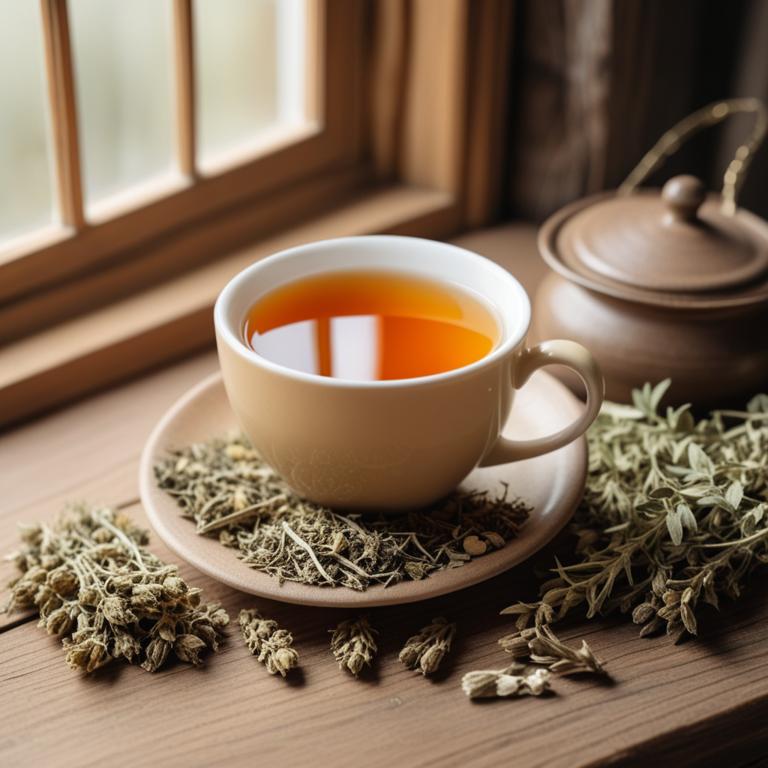
Withania somnifera teas contains a group of bioactive constituents, including withanolides, alkaloids, and saponins, which contribute to its therapeutic properties.
The withanolides, in particular, have anti-inflammatory and antioxidant effects that can help reduce joint inflammation and oxidative stress associated with osteoarthritis. The alkaloids and saponins in Withania somnifera teas also exhibit analgesic and anti-arthritic properties, which can help alleviate pain and stiffness in osteoarthritic joints. Furthermore, Withania somnifera teas has been shown to promote cartilage health and reduce cartilage degradation, which is a key factor in the progression of osteoarthritis.
By reducing inflammation, promoting cartilage health, and alleviating pain, Withania somnifera teas may provide relief for individuals suffering from osteoarthritis.
- Gather 1 cup of water and 1 teaspoon of dried Withania somnifera root.
- Heat the water in a pot and bring it to a boil.
- Reduce heat and add the dried Withania somnifera root to the water.
- Let it simmer for 5-7 minutes, then strain the mixture into a cup.
- Drink the tea 2-3 times a day, on an empty stomach, for best results.
10. Salvia miltiorrhiza
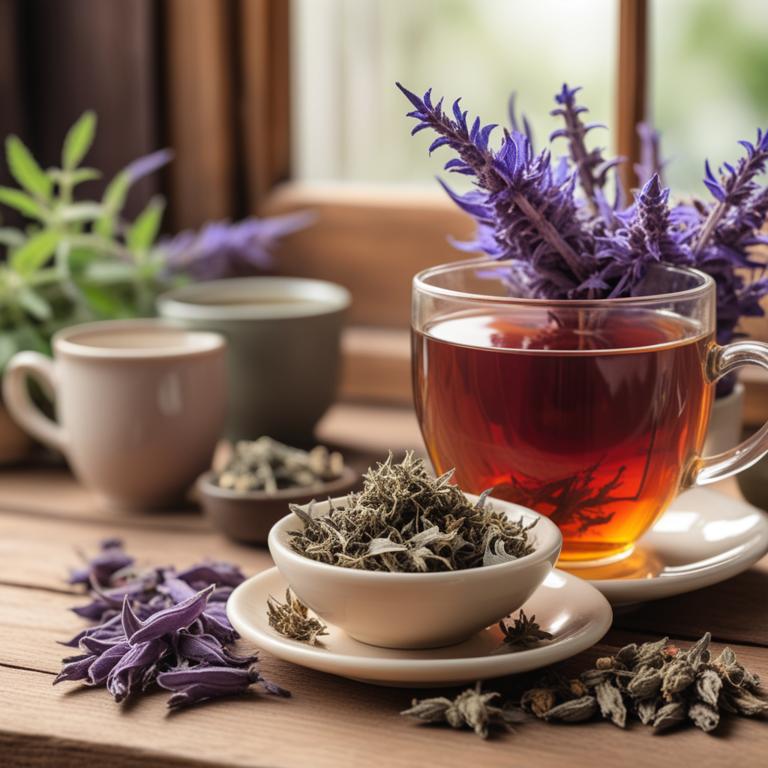
Salvia miltiorrhiza teas contains active constituents like tanshinones and salvianolic acids.
These compounds have anti-inflammatory and antioxidant properties that help reduce joint pain and inflammation in osteoarthritis. Tanshinones, specifically, have been shown to block the production of pro-inflammatory molecules, which are involved in the progression of osteoarthritis. Salvianolic acids have potent antioxidant effects, which help protect joints from damage caused by free radicals.
By reducing inflammation and oxidative stress, Salvia miltiorrhiza teas may help alleviate symptoms of osteoarthritis, such as pain and stiffness.
- Gather 2 tablespoons of dried Salvia miltiorrhiza root and 1 cup of boiling water.
- Combine the dried root with the boiling water in a teapot or cup.
- Steep for 5-10 minutes, then strain the liquid into another cup.
- Add 1 tablespoon of honey (optional) to the tea for flavor.
- Drink the tea 2-3 times a day, ideally between meals, to help with osteoarthritis symptoms.
11. Rheum palmatum

Rheum palmatum teas contains bioactive constituents like rhein, emodin, and chrysophanic acid, which have potent anti-inflammatory properties.
These compounds help reduce swelling and pain in joints affected by osteoarthritis by inhibiting the production of pro-inflammatory enzymes and mediators. Rhein, in particular, has been shown to suppress the activity of COX-2, an enzyme involved in pain and inflammation. Chrysophanic acid also has antioxidant properties, which help protect joint tissues from oxidative damage and promote healing.
By reducing inflammation and promoting healing, Rheum palmatum teas may provide relief from osteoarthritis symptoms.
- Gather 2 tablespoons of dried Rheum palmatum root and 1 cup of water.
- Boil the water in a pot and then reduce the heat to medium.
- Add the dried Rheum palmatum root to the pot and let it steep for 5-7 minutes.
- Strain the tea into a cup using a fine-mesh sieve or cheesecloth.
- Drink 1/2 cup of the tea 2-3 times a day, or as directed by a healthcare professional.